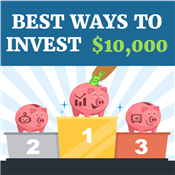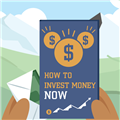The Best Way to Invest $30,000
Ad Disclosure: This article contains references to products from our partners. We may receive compensation if you apply or shop through links in our content. This compensation may impact how and where products appear on this site. You help support CreditDonkey by using our links.
What can you do with $30k? Here are the best ways to invest your savings. Think about what it'll be worth in 20 years if you start now.
 |
| © CreditDonkey |
Saving $30,000 is a feat to be proud of. But having more money can be stressful if you don't know what to do with it.
Is your money sitting untouched in a checking account? If so, maximizing your earnings will be near impossible. You need to get it invested somewhere.
Don't worry -- there are plenty of ways to grow your money.
To help you decide, we'll show you smart ways to invest your money (and three to avoid).
Here are 12 strategies to make your $30k grow:
- Take advantage of the stock market
- Invest in mutual funds or ETFs
- Invest in bonds
- Invest in CDs
- Fill a savings account
- Try peer-to-peer lending
- Start your own business
- Start a blog or a podcast
- Consider real estate investing
- Try fulfillment by Amazon
- Fix up your home
- Invest in yourself
|
|
|
Am I Ready to Start Investing?
Before investing, figure out whether it makes sense for your financial situation. Ask yourself these questions:
- Do I have a lot of personal debt?
- Do I have a 401(k)?
- Do I have an IRA?
You'll put yourself in a better position to invest if you tackle these first:
Pay Down Your Debts
Paying down debts can be just as profitable as investing and healthier for your finances in the long run.
Let's say you can get a 5% rate of return on your investment portfolio, but you have $30,000 in credit card debt with a 23% APR. If you focus on your portfolio instead of putting those funds toward credit card debt, you would end up paying more in interest and losing money.
If you have over $10,000 in debt, debt relief companies such as National Debt Relief may help.
Some low-interest debt, like a home mortgage, is OK to hold while making investments. You'll have low monthly payments with a low interest rate, which frees up your money to invest. Plus, your home itself is an investment that grows in value over time. That's why some people call it "healthy" debt.
Plan for Retirement
If you have your debt under control, make sure you're on track to meet your retirement goals. Join your employer's 401(k) plan. Check with your company to see what percentage they match. You should contribute at least that amount. If not, you're turning away free money offered by your employer.
Some employers vest their contribution to your 401(k). This means you'll have to work a certain amount of time to receive their match. But you'll get all the contributions you make, regardless of how long you work at the company.
Consider contributing the maximum amount to your 401(k), even if your company doesn't match. You'll save more for retirement while lowering your taxable income.
A traditional IRA or Roth IRA can also supplement your long-term savings.
With a traditional IRA, you can deduct the amount you contribute from your annual taxable income. You can't deduct that amount with a Roth IRA, but you can withdraw the money after retirement without being taxed.
You have other retirement savings options if you're self-employed. These include starting a 401(k) or a SEP (Simplified Employee Pension) IRA. Check with a tax professional to review your options.
Once your debt is under control and your retirement plan is on track, you can explore our list of the best ways to invest $30,000.
Which investment is best for you?
| If you have… | Try investing in… | Recommended |
|---|---|---|
| Less than 5 years | Certificates of Deposit (CDs) | Quontic Bank |
| 5 to 10 years | Stocks | Webull |
| More than 10 years | Mutual funds/ETFs | Ally Invest |
Smart Ways to Invest $30,000
Now that you're ready to grow your money, here are some great ways you could invest $30,000:
- Invest in Stocks
You can use an online brokerage account, like Ally Invest, to trade stocks. Look for companies with easy-to-use interface and resources for new investors.Take your time to learn about each company and what they have to offer. Familiarize yourself with the news, stock performance histories, and professional forecasts. You can even practice trading online without actually investing money.
When you feel comfortable, choose one or two stocks that you're familiar with. Make sure the investment matches your risk tolerance. And remember to start small until you feel comfortable with the process.
Losing or gaining money can be emotional. To avoid making rash decisions in the heat of the moment, set a plan and stick to it. Decide the amount you want to invest and know how much you're willing to lose.
Understanding Risk
It's important to know the possible risks before choosing the right investment for you. These risks include market risk, business risk, political risk, and liquidity risk.The higher the reward, the higher risk. If you take a loss, weigh the risks again to decide whether to pull your investment.
Thinking of investing in stocks? Take a look at Motley Fool Stock Advisor's latest recommendations.
Stock Advisor - $99/year for New Members
*$99 is an introductory price for new members only. 50% discount based on current list price of Stock Advisor of $199/year. Membership will renew annually at the then-current list price.
- Invest in Mutual Funds or ETFs
Instead of investing in one company like with stocks, mutual funds and ETFs let you diversify between stocks, bonds, and other short-term investments. That way, you can invest in many securities all at once.Ally Invest, Robinhood, and TD Ameritrade are some of the most popular brokerages. See How to Invest Money for more detail.
You can use an index fund for longer-term goals like retirement. These funds match a specific market index, such as the S&P 500. The idea is that these funds will closely mimic market returns. They require very little management and often have lower fees.
- Invest in Bonds
Bonds are loans made to big organizations. You can invest in them like you would with stocks, but they tend to be more predictable than stocks (read our guide for more information about the differences between stocks and bonds).There are three main types of bonds:
- Corporate, which are issued by corporations and have the highest risk
- Municipal, which are issued by towns and cities and have less risk but lower returns
- Treasury, or T-bonds, which are issued by the government and have the lowest risk and lowest returns
Bonds have different ratings based on the credit of the issuer. You can calculate your return on a bond before you buy it, based on its rate and period of maturity.
As with any investment, bonds carry some risk. When interest rates rise, bond prices fall. So, if you sell a bond before its maturity date, you could make less than the price you paid.
Most bonds must be purchased through a broker, but T-bonds can be bought directly from the government.
- Corporate, which are issued by corporations and have the highest risk
- Invest in CDs
If you're looking for something with less risk and decent returns, try investing in CDs. For higher interest rates, go with an online bank instead of a traditional bank like Chase.The longer you invest your money in a CD, the higher the APY (annual percentage yield). The APY is also usually higher on accounts with a higher required minimum.
High-Yield CD Rates - Up to 3.80% APY
- No fees
- $1 minimum deposit
- FDIC insured
Term CD Rates 3 Month 3.80% APY 4 Month 3.50% APY 6 Month 3.50% APY 9 Month 3.40% APY 12 Month 3.30% APY - Fill an Online Savings Account
The savings account at your local bank where you have a checking account probably offers measly returns. But you could get rates that are up to 10 times higher with an online savings account.An example of an account with a high APY is CIT Bank's Platinum Savings. Take a look at our CIT promo code page to learn more.
Before you invest, make sure the FDIC insures the bank. Read the fine print regarding withdrawals and account minimums. Some banks charge withdrawal fees. Make sure you can access your money when you need it. If you want a debit card, check that the bank offers it.
CIT Bank Platinum Savings - $300 Bonus
- Qualify for a $300 cash bonus with a minimum deposit of $50,000
- This limited time offer to qualify for a $225 cash bonus with a minimum deposit of $25,000 or a $300 bonus with a minimum deposit of $50,000 is available to New and Existing Customers who meet the Platinum Savings promotion criteria. The Promotion begins on September 23, 2025 and can end at any time without notice.
OverviewDisclosuresSavings Calculator - Try Peer-to-Peer Lending
Peer-to-peer (P2P) lending is a somewhat new way to invest. It's a good choice if you don't want to deal with a bank. You can connect with borrowers all over the world by becoming a lender on a P2P platform.With P2P lending, you'll see a high rate of return with low risk. Prosper is one of the most popular P2P platforms. They work as a middleman between you and the borrower.
They'll help you by funding the loans after you pay them, collecting payments, and taking legal action if the borrower defaults. You can diversify your risk by splitting your money up between multiple borrowers with low borrowing needs.
- Start Your Own Business
If you want to be your own boss and break out of your 9-to-5 job, you could try investing money in your own business. But make sure you have a solid plan before you even consider starting your own business.Make sure you get all the help you can. Check out the Small Business Administration's website for advice. They have resources for both beginners and experienced business owners.
- Start a Blog or a Podcast
Many people start a blog or podcast as a side gig. You can write when you have time and partner with businesses to make money. Blogs have the potential to make you a steady stream of income through advertising.Your $30,000 is more than enough to get you started. You'll be able to support yourself for a few months while you get your content going. You can use some of that money to get a domain name and web hosting service. You can also use it to invest in equipment like video recorders, microphones, cameras, or a better computer.
The podcast world is increasingly difficult to break into, but there is still room to make money. You should be prepared to dedicate a lot of time and energy to producing regular content. If it's something you enjoy doing, you can try to monetize your podcast by selling ad time.
- Invest in Real Estate
While you probably won't find many options for individual properties for less than $30,000, you can still invest in real estate through real estate investment trusts (REITs). You can invest in a share of a REIT just like you would invest in a stock.REITs make money from the rent collected from properties.
You could also invest in real estate through online investing platforms such as Fundrise. The platform will build a portfolio of properties for you. You earn returns from dividends and property appreciation.
Invitation Program - Up to $100 Share Bonus
Earn up to $100 share bonus for each friend who successfully joins Fundrise through your unique referral link.
- Try Fulfillment by Amazon
You can get into the retail business through Fulfillment by Amazon. You ship the items that you want to sell to Amazon, and they fulfill any orders you get and send them to the customer.Rates vary by the size of the packages and the amount of warehouse space you'll need. But $30,000 is plenty to get a small operation going.
You'll get access to Amazon's large marketplace of buyers without having to do all the work involved with other selling sites. It almost provides immediate gratification. You can sell new or used items.
- Improve Your Home
If your home is old or outdated, improvements and repairs can have a direct impact on your home's value.The changes don't have to be huge either. Major bathroom and kitchen remodel don't have a great return on investment. Smaller projects like new windows or new siding actually pay off better.
If you make energy-efficient improvements to your house, you could even get a tax break for the new changes.[1]
- Invest $30,000 in Yourself
You can use your savings to continue your education and improve your career and earning prospects. With some time and effort, you can turn your $30,000 into much larger earnings.- Take online courses: Learn or sharpen a skill with Udemy courses, webinars, or workshops. These can help you improve in your current job or get you started on a side job.
- Find a mentor: Is there a businessman you look up to? Does your favorite web expert offer one-on-one coaching sessions via Skype? Getting advice from someone who has done it before is one of the best things you can do to find direction.
- Get a personal trainer: It's important to invest in your health. Daily exercise gives you more energy and puts your health on the right track for years down the line.
3 Investments to Avoid
Some types of "investments" aren't really investments at all. In fact, you could easily lose your $30,000 if you put it into a risky scheme.
Here are some examples of what to avoid when investing your money:
- Penny Stocks
Stocks that you can buy for less than $5 may seem like a great deal. After all, with $30,000, you could buy a lot of these shares and hopefully see massive profits. But more often, they're not profitable at all.Companies that offer penny stocks are usually very small companies that don't need to disclose their financials. They may be trying to raise capital to grow, but they're not always successful in the long run.
- Pyramid Schemes
You may have heard of businesses that promise to make you rich if you can recruit others to join them. If you're asked to pay to join a business with that type of model, be aware that it can't provide a win-win situation for everyone. - Gambling
Yes, you could win big with gambling if you're lucky, but people rarely do. Statistically, you are much more likely to lose your money when you gamble. That's true whether you're playing in a casino or buying a lottery ticket. The odds are not in your favor. So while gambling may be entertaining, it's a poor investment choice.
Bottom Line
The sooner you can start to safely invest your funds, the more you can benefit from the returns.
Remember to review your finances to make sure you are in the best position to start investing. And avoid risky investments with empty promises like penny stocks and pyramid schemes that may not be what they seem.
CIT Bank Platinum Savings - $300 Bonus
- Qualify for a $300 cash bonus with a minimum deposit of $50,000
- This limited time offer to qualify for a $225 cash bonus with a minimum deposit of $25,000 or a $300 bonus with a minimum deposit of $50,000 is available to New and Existing Customers who meet the Platinum Savings promotion criteria. The Promotion begins on September 23, 2025 and can end at any time without notice.
High-Yield Savings Account - Up to $2,000 Bonus
- Open your first account through Raisin by December 31, 2025 using promo code GIFT.
- Make your qualifying deposit before January 14th to be eligible for the first quarter's bonus.
- Maintain your balance through the end of each quarter to earn cash payouts every three months.
- Add more funds anytime before the next bonus deadline to move up a tier and earn even more.
| Deposit | Quarterly Bonus | Total Potential (Year) |
|---|---|---|
| $10,000 | $20 | $80 |
| $25,000 | $50 | $200 |
| $50,000 | $100 | $400 |
| $100,000 | $200 | $800 |
| $250,000 | $500 | $2,000 |
Business Premium Savings - Up to 3.60% APY
- Bundle with checking and unlock a bonus of up to $600.
- Discover the Axos Business Bundle, combining flexible checking with high-yield savings and earn an exclusive bonus up to $600. Use promo code SBB600.†
- Earn 3.60% APY* With Business Premium Savings
- Free domestic and international incoming wires
- No monthly maintenance fee
- No minimum opening deposit
- No average daily balance requirement
- Business deposit accounts FDIC insured up to $250k
J.P. Morgan Self-Directed Investing - Get Up to $700
- Get up to $700 when you open and fund a J.P. Morgan Self-Directed Investing account with qualifying new money.
- $700 when you fund with $250,000 or more
- $325 when you fund with $100,000-$249,999
- $150 when you fund with $25,000-$99,999
- $50 when you fund with $5,000-$24,999
- Get unlimited commission-free online stock, ETF, fixed income, and options trades when you open an account.
- $0 Online Commission trades
- Choose an account that's right for you: General Investing, Traditional IRA or Roth IRA.
- Access our secure, easy-to-use trading experience online or through the Chase Mobile® app.
- Our powerful tools and resources are built to help you take control of your investments.
INVESTMENT AND INSURANCE PRODUCTS ARE:
Transfer and Earn Up to $5,000 Bonus
Enroll your new eligible TradeStation account in this offer either by using promo code BDEVAGFG on your new account application or by requesting to enroll, via telephone, with a TradeStation Representative. Within 45 days of account enrollment, fund your account with at least $500. Maintain at least $500 in your account for 270 calendar days. New assets will be aggregated during the 45-calendar day period following the enrollment date to determine the amount of your cash offer.
| New Assets | Cash Bonus |
|---|---|
| $500 - $24,999 | $50 |
| $25,000 – $99,999 | $250 |
| $100,000 – $199,999 | $400 |
| $200,000 – $999,999 | $800 |
| $1,000,000 – 1,999,999 | $3,000 |
| $2,000,000+ | $5,000 |
Invest in Real Estate with $10+
- Only $10 minimum investment
- Get a diversified portfolio of real estate projects across the US
- Open to all investors
Invest in Real Estate with $100
- Short-term real estate investments lasting just 6-18 months
- Open to non-accredited investors
- Low fees
Start Investing in Real Estate
- Access to private real estate managed by experienced investors
- Earn passive income from dividends
- Open to all investors
References
- ^ ENERGY STAR. Federal Tax Credits for Energy Efficiency, Retrieved 07/10/2024
Write to Rebecca M at feedback@creditdonkey.com. Follow us on Twitter and Facebook for our latest posts.
Note: This website is made possible through financial relationships with some of the products and services mentioned on this site. We may receive compensation if you shop through links in our content. You do not have to use our links, but you help support CreditDonkey if you do.
Fundrise, LLC ("Fundrise") compensates CreditDonkey Inc for new leads. CreditDonkey Inc is not an investment client of Fundrise.
|
|
|




















